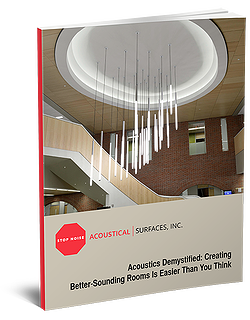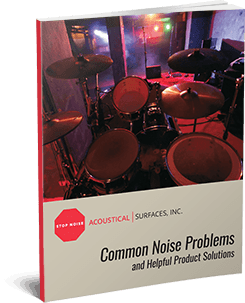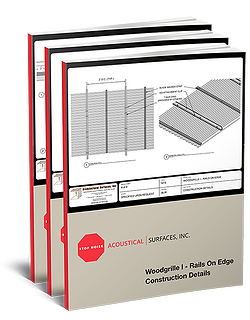Soundproof Fences: How Do They Work?
We install soundproof fences on our properties for lots of reasons. They keep our children and pets in our yards where we can see them, they create a nice backdrop for our landscaping, they create clear boundaries between one space and the next, and they help protect our property, along with creating a noise barrier. With all these benefits, it’s easy to see why there are nearly 54,000 fencing companies operating in the US as of this writing.
Noise reduction fences also provide an often overlooked benefit, which is sound control. When you soundproof a fence, you double up on the privacy provided by your new acoustic barrier.
If you are in the market for a new sound barrier fence, many options today provide premium soundproofing that will leave you wondering how you ever got by without one. If you’ve already got a fence, there are simple ways you can increase your sound control quickly and easily. Let’s look at some of the reasons people utilize soundproof fences, as well as how to retrofit your existing fence to keep neighborhood and road noise out of your backyard oasis.
Reasons to Soundproof a Fence
Most of the reasons we put up soundproof fencing have to do with aesthetics and corralling members of our families that are prone to wander. But when it comes to outdoor soundproofing, fence builders often miss the mark. By adding soundproofing materials to your fence, you can get a whole lot more out of your beautiful new barrier.
Most solutions for soundproofing will also help block wind and lines of sight, so they offer protection from much more than just airborne noise. What is airborne noise? It’s any sound wave that travels through open spaces to reach our ears. Let’s look at some airborne noises that provide good reasons to soundproof a fence and keep unwanted noise from reaching our ears.
Noisy Neighbors
If you’ve ever lived or worked next door to a noisy neighbor, you fully understand the importance of this point. Whether they have regular pool parties that stretch late into the night, have a dog that barks at all hours of the day, or are engaged in noisy industrial activities, that noise can keep you from fully relaxing after work and on the weekends, focusing at work, and can even prevent you from getting a solid night’s sleep.
Traffic
If you live on a busy street, the traffic noise created by a constant parade of cars can cause the same issues as noisy neighbors. However, streets come with the added bummer of never sleeping. Streets have no closing time, and that traffic is capable of creating noise 24 hours a day. Building a backyard sound barrier fence is a great solution to this persistent problem.
Increase Privacy on Your Property
Sometimes people are simply looking to add a little privacy to their backyard barbecues and gatherings. Acoustic fencing is a great way to create a noise wall and keep your conversations contained and allow you to enjoy your BBQ or day at the pool without attracting unwanted attention from nosy neighbors.
Keep Your Neighbors Happy
Sometimes we are the ones causing the noise, but still, want to soundproof a fence to keep our neighbors happy. Whether we’ve got a barking dog, host noisy pool parties on a regular basis, or run lots of noisy machines on our property, dealing with that backyard noise before it reaches their ears will go a long way.
If you operate a business on your property, it’s especially important to address noise. There are likely all kinds of processes and machines that are essential to your business but also capable of creating enough noise to leave your neighbors irked. Build a sound barrier fence to keep those noises contained.
How to Soundproof a Fence
With the exception of chain link fences, most types of residential or commercial sound wall fencing will reduce some sound. That’s because sound has trouble passing through solid objects. When sound waves strike the surface of your fence, some of the waves bounce off, and others transform into noise vibration energy, leaving you with muffled sounds on the other side.
Some fences do a decent job of blocking sound, and others, not so much. If you want more sound control out of your existing fence, sound proof fencing can help. Here’s how to do it.
Add Mass
The first step in preventing sound passage through any surface is to add mass. The more mass a surface has, the harder it is for external noise to pass through. The more mass you add, the greater the soundproofing.
If you’ve got a concrete fence, you’ve got very little to do. But if you’re working with any other material, you’ll have to identify the best way to add enough mass to your fence that it blocks out whatever noises you’re trying to keep out.
Cover any Gaps
As a rule of thumb, if air can pass through a gap, so can sound waves. A chain link fence is virtually all gaps, so it doesn’t really provide any soundproofing benefits whatsoever. If that’s what you’ve got, you’ll want to consider a new fence.
A wood fence can block a decent amount of sound, but if you cover the gaps between the boards with acoustic fence materials, you’ll get significantly better results. Add some density to your boards, and you’ll be in decent shape by reducing the sound you receive, and any noise pollution you put out.
Make Sure You’ve Got Enough Height
If you want to effectively reduce sound transmission through your fence, you’ll have to make sure it’s tall enough to catch all the airborne environmental noise in the neighborhood. A four-foot chain link fence will keep the kids and pets contained, but even if you soundproof it, you’ll get little relief from your noisy neighborhood.
A six to eight foot fence will block much more sound, as it can absorb sounds coming from many different angles. It also provides more privacy, making you feel much better about sunbathing in the backyard or storing expensive machinery on your property.
What materials should I use to soundproof a fence?
When we soundproof a fence, the process looks a little different than it would if we were soundproofing an interior room of a home or office. We aren’t dealing with walls, so we can’t add things like a layer of drywall or sound reduction acoustical insulation.
The specific materials we use to soundproof a fence must be designed to be used outdoors and solve the problems associated with most fencing when it comes to acoustics. Let’s look at a few of the most effective outdoor acoustic fence panels on the market.
Echo Barrier
One highly effective piece of fence soundproofing material is the Echo Barrier. It’s lightweight and easy to install yourself, but it’s built rugged enough to handle all that nature has to offer.
These acoustic fence panels are effective enough to be used in industrial settings and outdoor music venues, so they’re a solid solution for any space and can address a good amount of sound pollution.
Soundproof Blankets or Curtains
Another great option when we’re looking to soundproof a fence is the addition of soundproof blankets or curtains to the fence panels. They are designed to absorb airborne noises and can turn your porous fence into a sound trapping barrier that sonically separates your property from the next.
Make sure to use blankets or curtains that are made to be used outdoors. They are sturdy enough for outdoor applications but can easily be rolled up and stored indoors for the winter when you aren’t getting as much use out of your outdoor spaces.
Mass Loaded Vinyl
One of the easiest ways to add mass to your existing fence is with mass-loaded vinyl. You can get it in rolls and easily apply it to your existing fence. You can use it on its own, but adding a second layer of fence material on top of it will give you better performance and a much cleaner look by creating a sound barrier fence.
Landscaping
While it’s not a soundproofing material, landscaping can help control sounds in your outdoor spaces. Adding large dense bushes won’t block sounds but can be a fairly effective way of absorbing and scattering sound waves. Place them around the perimeter, and you’ll reduce the number of sounds you have to contend with by creating a sound barrier.
Consult the Pros
Whether you’re just batting around sound barrier fence ideas or you’re ready to pull the trigger on your soundproofing project, it’s always helpful to consult the pros before you soundproof a fence. They can help make sure you are using the best products for your application, as well as make sure you know how to install it to achieve the best results.



